Fifty Years of Raising Hell: Hamm, His Older Allies, and Gen Z. Look to the Future

[caption id="attachment_115656" align="alignleft" width="300"]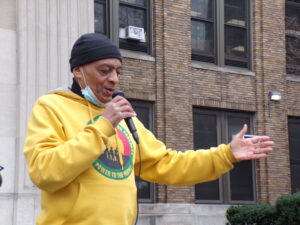 Hamm[/caption]
Hamm[/caption]
NEWARK - The warriors from the older battles locked arms again with the younger ones assuming the forward position in the same fight for social and economic justice, this time on the 50th anniversary of the student walkout at Arts High School.
It was grim in the rain, with a vaccination site in eyeshot across the street and masked, huddled forms occasionally raising their arms in solidarity with the group of all ages joined in common cause.
Local inequities propelled those Newark activists into the streets back in 1971, led by Larry Hamm, founder of the People's Organization for Progress (POP), who today stood outside his high school alma mater with other veterans of that storied protest, among them former Assemblyman Craig Stanley, Akil Buchannan, and Jimmy Young.
[caption id="attachment_115657" align="alignnone" width="4608"]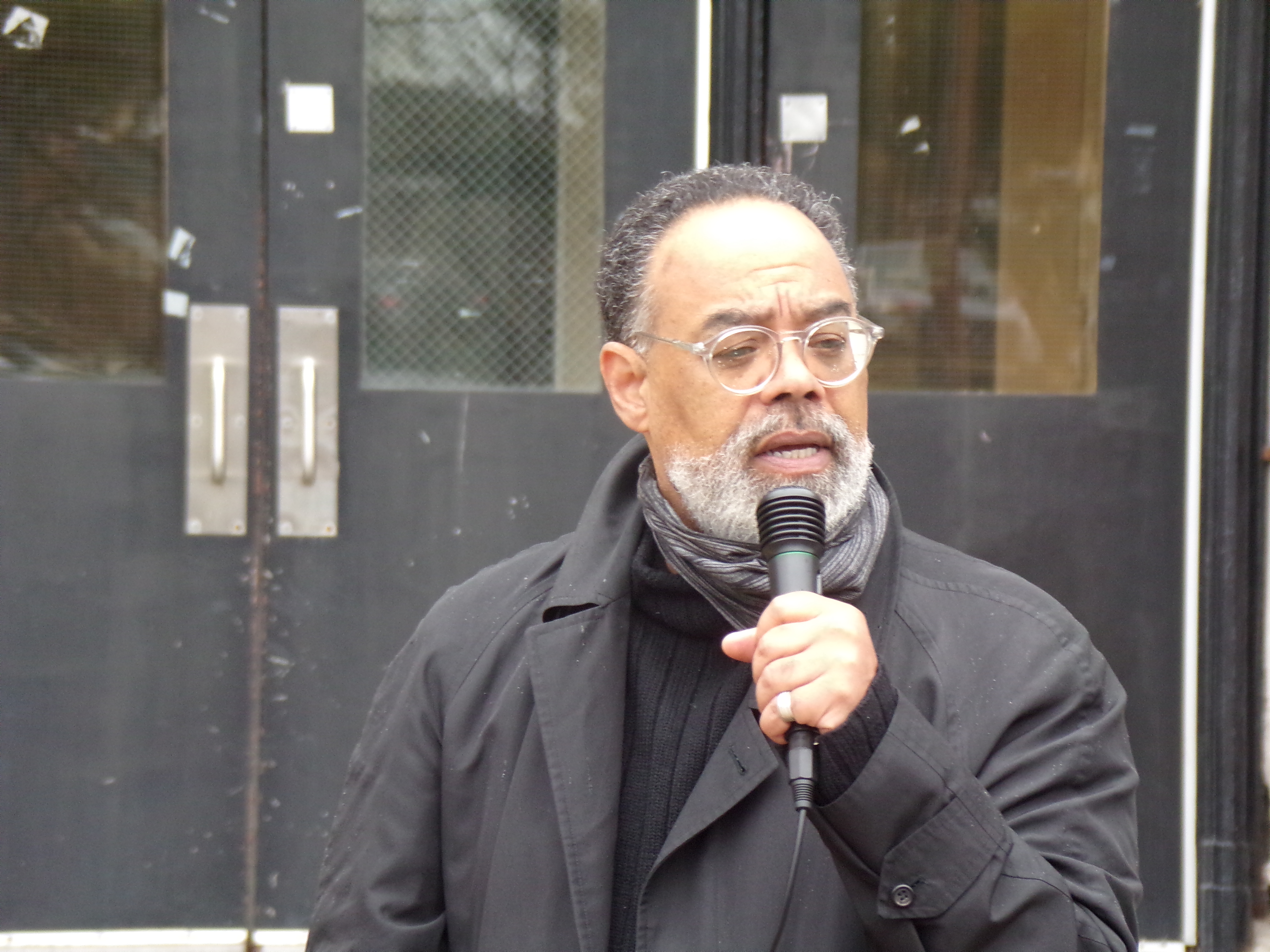 Buchannan[/caption]
Buchannan[/caption]
Gen Z. activists from Rutgers, Seton Hall and Montclair joined their elders on the sidewalk on Martin
[caption id="attachment_115660" align="alignright" width="300"]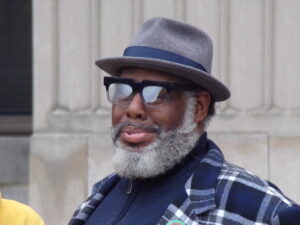 Jimmy Young[/caption]
Jimmy Young[/caption]
Luther King Blvd., uniting the longer abiding passions with their own struggle against police brutality and for social justice in the aftermath of the police killing of Minnesotan George Floyd.
"We are at civil war," Buchannan said. "This is the sequel happening. All young people must understand the contradictions of this place we call America. Young people have been at the forefront of every struggle in America. So let's encourage our young people again, because this country is at a crossroads between fascism and democracy."
Emani, a student at Rutgers Law School, (pictured, top) reinforced the sentiment.
"You need to read but you also need to be in the streets you need to understand your community. That's what building power is - building a community, building a collective power," she said. "I'm here out of respect and revolutionary love for what they did in the 60's and 70's," as well as to remind the crowd to take action on Friday at noon in front of the Pete Rodino Federal Building in support of the release from prison of Mumia, an original Black Panther.
[caption id="attachment_115658" align="alignnone" width="4608"]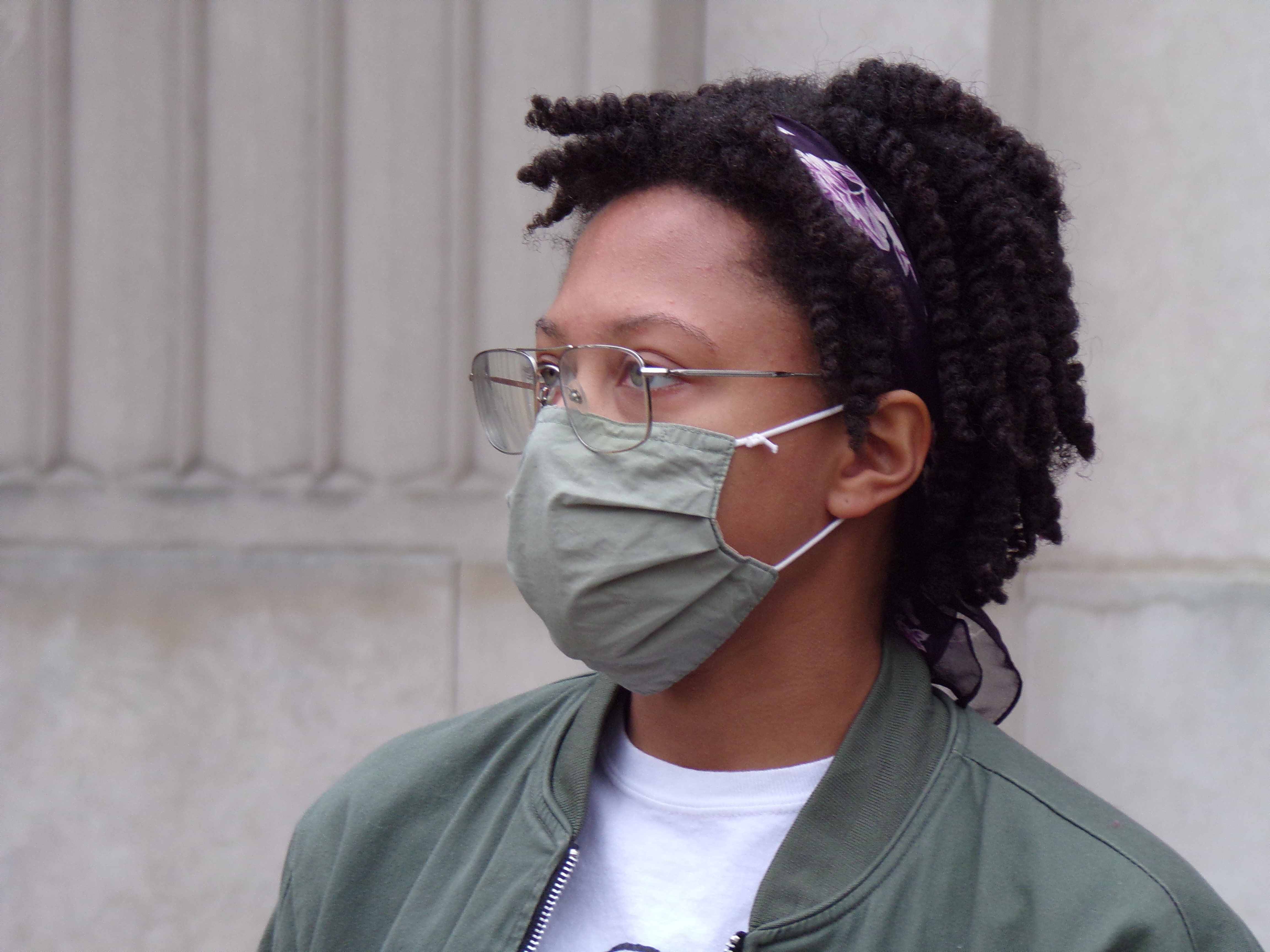 Muhammad[/caption]
Muhammad[/caption]
Young activist Jordan Muhammad noted how past generations - while productive - also spent too much time fighting one another. Gen Z. has the potential advantage not to be weighed down by past prejudices or pigeonholes. "We don't all have to be the same," Muhammad said. "We have to find our strengths. We've got to be in the streets but we've also got to be in the back rooms. We have to be reading."
Academic activists Dr. Akil Khalfani and Dr. Kelly Harris lent their support to the cause, along with
[caption id="attachment_115659" align="alignright" width="300"]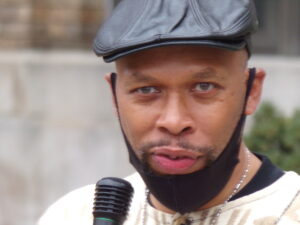 Dr. Khalfani[/caption]
Dr. Khalfani[/caption]
student Chris Duran.
"Coming in here with a missionary attitude - that was a lot of the problem," said Duran, referring to activists from outside Newark trying to change the world without a real, granular sense of the community they hoped to serve.
Hamm was the center of it all again, the diehard movement leader intent on connecting with those representatives of the younger generation he welcomed, one by one to the microphone.
He forged connections with them in the Floyd era and now he wants to make certain those connections endure.
"The most outstanding thing after George Floyd's murder was that 20 million young people mobilized in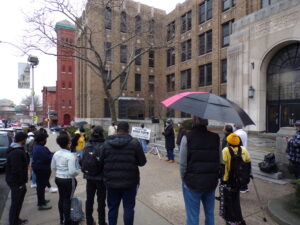 Black Lives Matter movement for justice for George Floyd," Hamm told InsiderNJ. "It was a magnificent outpouring, and it is my belief that [Officer] Derek Chauvin would not be on trial today if not for the largest social justice mobilization in human history. Now Chauvin is on trial because of Black Lives Matter, but the demonstrations have for the most part, in most of the country, subsided. What we need now, and one of the reasons I had this event today, was to commemorate the past, yes, but to commend the young people for their social protest last summer and express our solidarity with whatever protest they undertake going forward.
Black Lives Matter movement for justice for George Floyd," Hamm told InsiderNJ. "It was a magnificent outpouring, and it is my belief that [Officer] Derek Chauvin would not be on trial today if not for the largest social justice mobilization in human history. Now Chauvin is on trial because of Black Lives Matter, but the demonstrations have for the most part, in most of the country, subsided. What we need now, and one of the reasons I had this event today, was to commemorate the past, yes, but to commend the young people for their social protest last summer and express our solidarity with whatever protest they undertake going forward.
"March 1971 wasn't because of police brutality, it was because of educational issues - but there were police brutality cases in the community," Hamm added.
Many people - mostly youth activists - spoke.
But when someone mentioned voter registration drives and marijuana legalization without meaningful expungement provisions, a local activist named Africa objected.
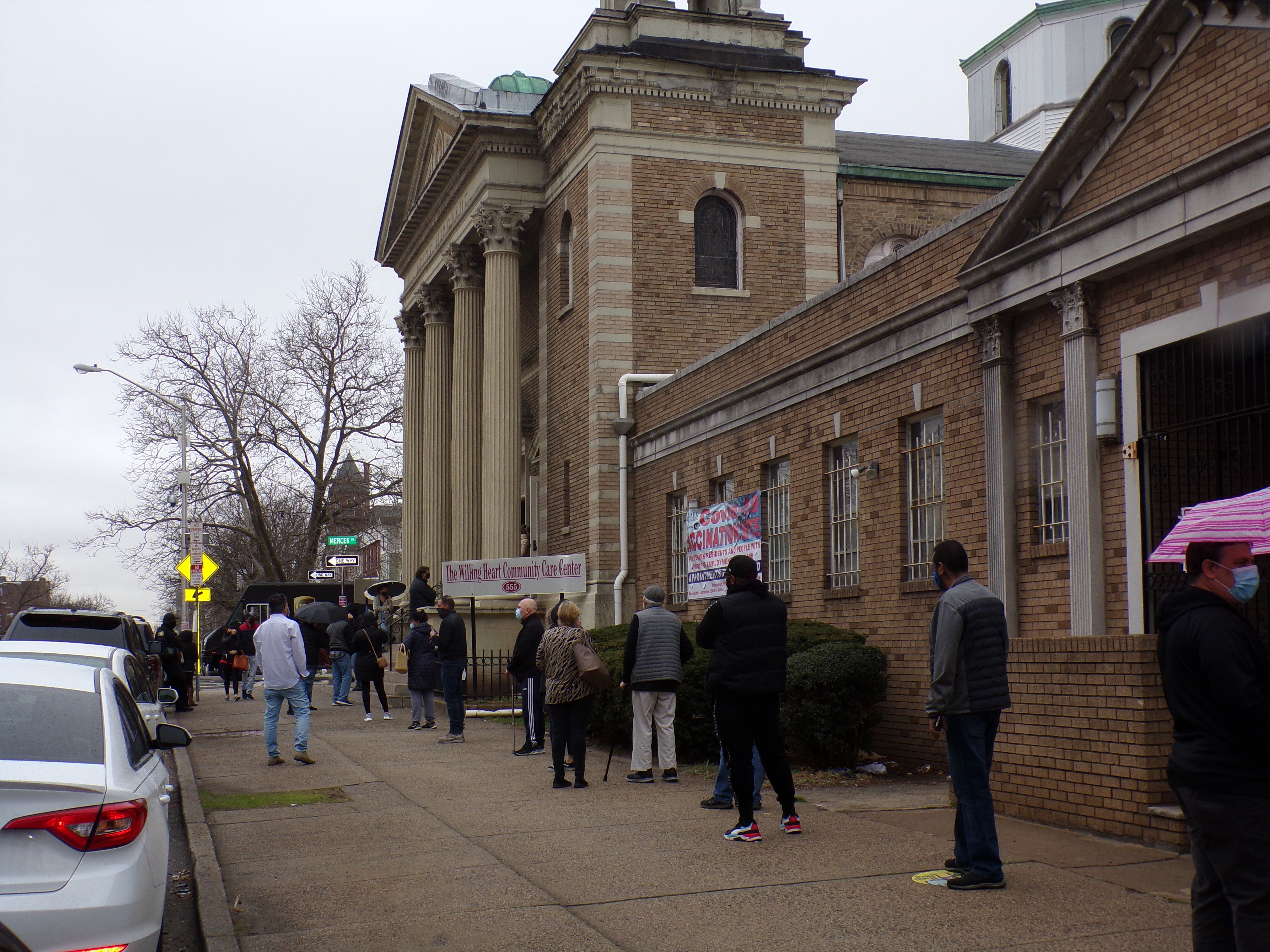
Hamm gave him the microphone toward the end of the commemoration.
While Africa spoke, across the street the line of masked people awaiting vaccination stretched down the sidewalk.
"It wasn't no white man showing up with KKK shirts," shouted Africa, his voice breaking with emotion. "It was the same [people] in my community who told me they fight for me who said they loved our kids. You don't love our kids. You sat there and let them drink poisoned water. I don't want to talk no more about going to vote. I need them to come together to build our own institutions. Trump won, and from day one, they started telling us the ones that didn't vote were the problem. They didn't look inside themselves to say the charter schools, the poisoned water, the black people drying in the streets is the problem. Everybody I know is or has been in prison."
[video width="640" height="360" mp4="https://www.insidernj.com/wp-content/uploads/2021/03/0324211353.mp4"][/video]
[caption id="attachment_115662" align="alignnone" width="2822"]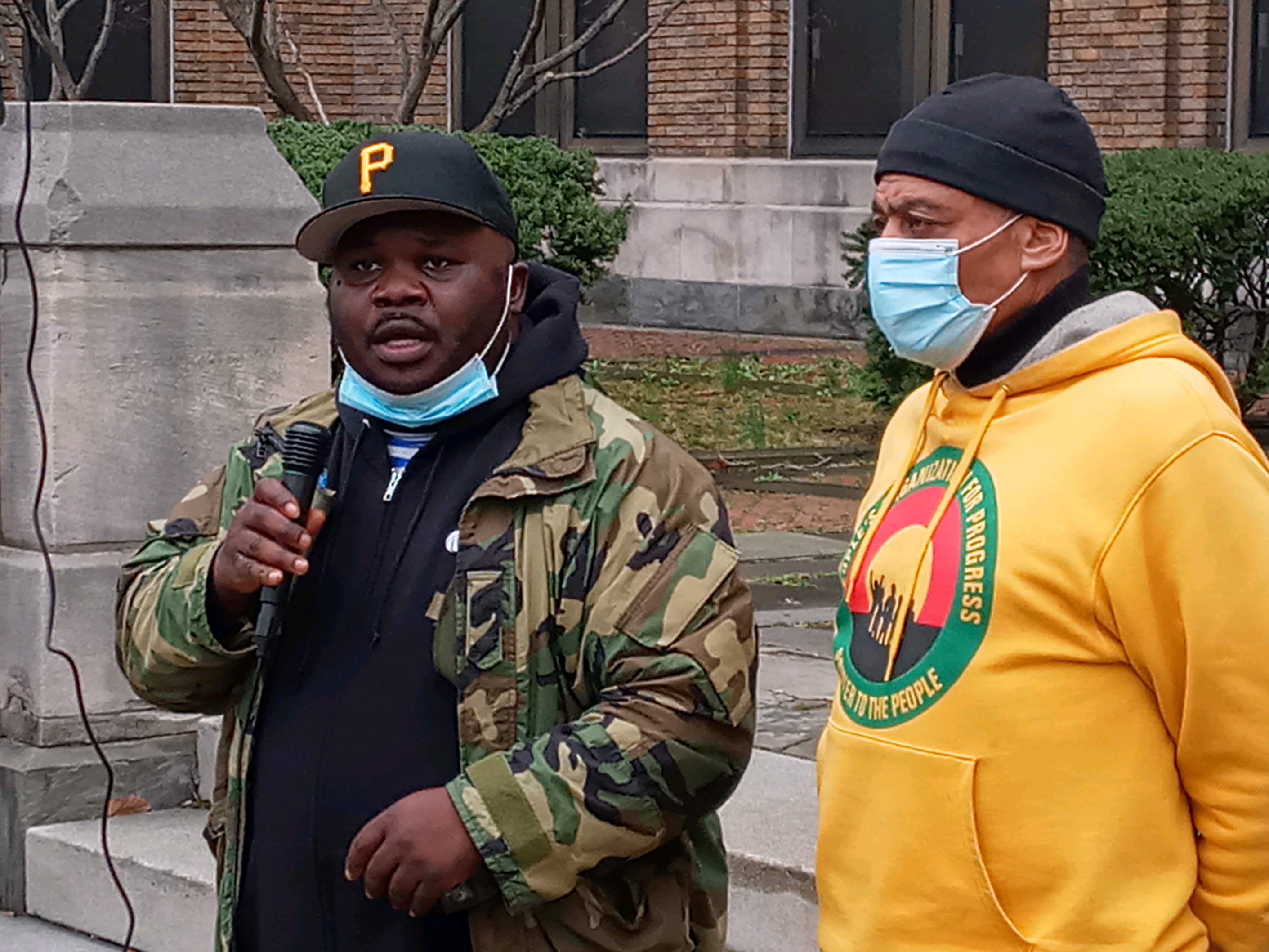 Hamm, right, and Africa.[/caption]
Hamm, right, and Africa.[/caption]





